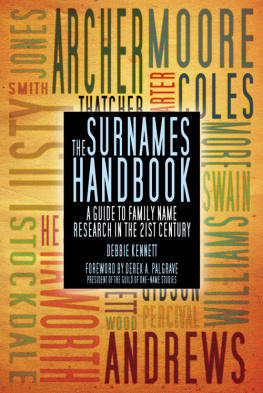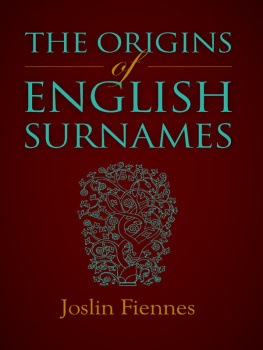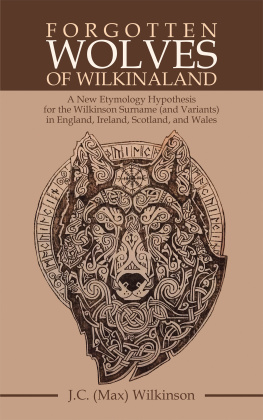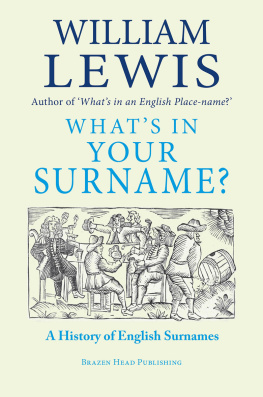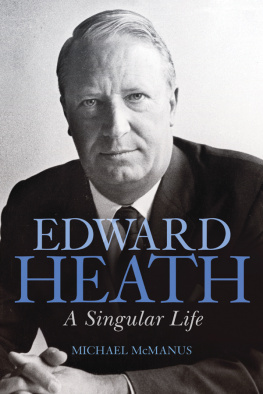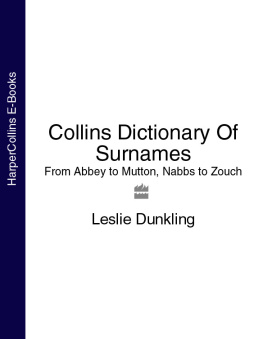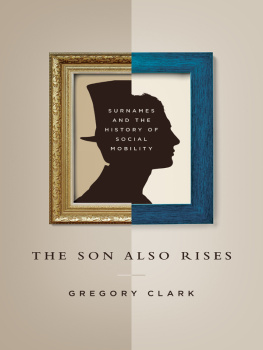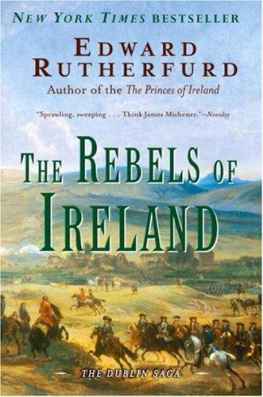The
SURNAMES
of
IRELAND
BY THE SAME AUTHOR, FROM IRISH ACADEMIC PRESS
Irish Families:
Their Names, Arms & Origins
Dr MacLysaghts major work on Irish family history is now in its fourth edition. This volume, complete in itself, covers the most widespread and prominent names with an article on each. The book is handsomely illustrated by Myra Maguire with 27 full-clour plates depicting 243 family arms.
More Irish Families
This second, companion, volume greatly expands the range of Irish Families. It incorporates the authors earlier book of the same title and his Supplement to Irish Families, and carries an essay on Irish chieftainries.
For anyone with an interest in genealogy this book is a must. It is, and is likely to remain so, the standard reference work in this field Cork Examiner.
Together with the original Irish Families, the book presents the result of the labours of Dr Edward MacLysaght.... Libraries and genealogists who wish to have an encyclopaedia of Irish name lore at their elbow will invest in this rara avis, a definitive work Nova Scotia Genealogist.
This compulsion to keep browsing on from name to name can be ascribed to MacLysaghts captivating style, a unique blend of the scholarly and the mundane.... This is the kind of book it iscompendious, accurate, yet full of fascinating anecdotes and witty asides Journal of the Cork Historical and Archaeological Society.
The
SURNAMES
of
IRELAND
SIXTH EDITION
EDWARD M AC LYSAGHT
MA DLITT MRIA
First published in 1985 by
Irish Academic Press
10 Georges Street
Newbridge
Co. Kildare
Ireland
www.iap.ie
Edward MacLysaght 1999
Sixth edition 1985
Reprinted 1991, 1997, 1999, 2005, 2007, 2017
A catalogue record for this title is available
from the British Library
ISBN 978-1-911024-63-7 (Kindle)
ISBN 978-1-911024-64-4 (Epub)
Library of Congress Cataloging in Publication Data
An entry can be found on request
All rights reserved. Without limiting the rights under copyright reserved alone, no part of this publication may be reproduced, stored in or introduced into a retrieval system, or transmitted, in any form or by any means (electronic, mechanical, photocopying, recording or otherwise) without the prior written permission of both the copyright owner and the above publisher of this book.
Contents
Preface
This book is an epitome of the essential facts given in the three volumes of my Irish Families series, together with similar information on some 1,500 additional names not dealt with in them. To assist readers seeking a fuller account of a particular name, references to articles in the Irish Families series are given where this is available (such references will be found with about one-fifth of the names in this book), IF standing for Irish Families, their names, arms and origins and MIF for More Irish Families (incorporating Supplement to Irish Families). Variant forms account for a further four hundred additional entries. The method adopted in the presentation of variants is explained in the Introduction.
In my search for data relating to the more uncommon surnames still extant in Ireland I have received information from several people with specialized local knowledge. In addition to those whose help has already been acknowledged in the volumes of the Irish Families series I have pleasure in thanking also Sir Henry Blackall, Mr Hubert Butler, Dr Arthur Moore, Fr Patrick Egan, Mr Dermot Foley, Fr Peadar Livingstone, Mr Philip MacGuinness, Mr Seamus Concobhair, Mr Muiris Droighneain and Fr C.J. Travers whose suggestions have proved most helpful, and Mr Kenneth Nicholls, who was especially helpful in elucidating problems relating to the fourteenth to sixteenth centuries; and perhaps it would not be invidious to mention again the assistance I have derived from the extensive communications I received from Mr P.J. Kennedy and the late Mr C.J. MacDonagh, I would like also to thank Professor E. G. Quin, Mrs Mairin ODaly, Professor Gerard MacNicholl and Mrs Nessa Doran who have with patience helped me in the difficult task of elucidating the derivation of Irish surnames. As I point out in the Introduction many of these are conjectural and I must make it clear that their help consisted of advice rather than final decisions.
EDWARD MacLYSAGHT
31 January 1985
Introduction
Ireland was one of the earliest countries to evolve a system of hereditary surnames: they came into being fairly generally in the eleventh century, and indeed a few were formed before the year 1000. The traditional belief that the system was introduced deliberately by Brian Boru is without foundation: it developed spontaneously in Ireland, as elsewhere, as the population increased and the former practice, first of single names and then of ephemeral patronymics or agnomina of the nickname type proved insufficiently definitive.
At first the surname was formed by prefixing Mac to the fathers Christian name or to that of a grandfather or earlier ancestor. Names with the prefixes Mac and even O, apparently surnames, will be found in the records relating to centuries before the tenth, but these were ephemeral not hereditary. After a time other types of surname were adopted, still with the prefixes Mac and sometimes : for example those which introduced the words giolla and maol both usually meaning follower or servant, often in the sense of devotee of some saint e.g. Mac Giolla Mhrtain (modern Gilmartin or Martin) or Maoil-bhreanainn (modern Mulrennan) from St. Martin and St. Brendan.* Perhaps the most numerous of the later names were those formed from the occupation of the father, as for example Mac an Bhird, son of the bard (modern MacWard and Ward) or hceadhacidhe, doctor or healer(modern Hickey).
Similarly, but less often, the Mac and were prefixed to some word denoting character or peculiarity of the father or grandfather, e.g. Mac Dubhghaill, black stranger (modern MacDowell). From this it was a short step to the incorporation of nicknames in permanent surnames, for instance Mac an Mhadaidhmada, dog (now MacAvaddy etc., cognate with Madin, Madden).
The common practice of adding an epithet denoting some personal characteristic to the Christian name and surname eventually led in some cases to the loss of the surname proper and the substitution of the epithet for it. In that way arose Gaelic surnames without the distinctive Mac or O: thus ban (white) became Bane, ruadh (red) Roe, lidir (strong) Lawder, and so on. Similarly agnomina such as Caomhnach (Kavanagh) became hereditary surnames without a Gaelic prefix, though an has sometimes been erroneously inserted in more modern times.
I have used the word Gaelic, and this perhaps needs clarification. To many people unfamiliar with Ireland this word denotes a language once widely spoken in the Highlands of Scotland and still extant there. In Ireland when speaking English we call the Gaelic language Irish, though in Irish the word is, in the modern spelling, Gaeilge. As an adjective, however. Gaelic is used to denote the race which has inhabited Ireland since prehistoric times. Scottish Gaelic is basically the same as the Irish language, of which it is an offshoot. The fact that the Gaels of Scotland are the descendants of Gaelic settlers from Ireland seems not be be generally known, though Scotland got its name from them, the word Scotus being the Latin for Irishman, as exemplified in the name of the famous ninth century Irish philosopher. Johannes Scotus Eriugena.




